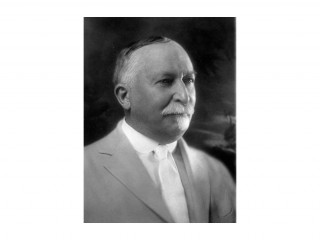
John Harvey Kellogg biography
Date of birth : 1852-02-26
Date of death : 1943-12-14
Birthplace : Tyrone, New York,U.S.
Nationality : American
Category : Science and Technology
Last modified : 2011-10-04
Credited as : Medicine, Writer, Corn flakes cereals
0 votes so far
Fresh out of medical school, Dr John Harvey Kellogg became chief physician at the Western Health Reform Institute of Battle Creek, a home for healthy diet and lifestyle that had been founded by Seventh Day Adventist leader Ellen G. White in 1866. Kellogg soon renamed it the Battle Creek Sanitarium (a word coined by Kellogg), and patients were served only whole grains, fruits, nuts, legumes, and other healthy foods. As a doctor, however, Kellogg had some for eccentric ideas and methodologies.
He believed that almost all illness originated in the stomach and bowels, and counseled daily yogurt enemas to produce sparkling clean intestines. Virtually all other disease, he maintained, was caused by sexual intercourse. His odd therapies at the Sanitarium included seating patients in a vibrating chair, applying carbolic acid to the clitoris to prevent "harmful" female masturbation, immersion in freezing radium-laced water, and administering electric shocks at various parts of the body. T. C. Boyle's novel The Road to Wellville, and the 1994 film adaptation with Anthony Hopkins as Kellogg, were set in a fictionalized version of Kellogg's Sanitorium.
A best-selling author of health books, Kellogg argued that coffee was unhealthy for the liver, that indigestion was the leading cause of Americans' deaths, that spices from mustard to salt were unhealthy, and that vinegar was "a poison, not a food." He lectured on the advantages of celibacy, and proudly claimed that he and his wife (they were married more than forty years) had never had sex. He also sponsored "Race Betterment Conferences" in support of eugenics programs, and advocated racial segregation for "preservation of the human race".
As part of the Sanitarium's dietary program, Kellogg and his brother, Will Keith Kellogg, invented several foods made from grains, which were forced through rollers to make long sheets of dough. Called away while cooking wheat one day, when the brothers returned the wheat seemed overcooked. Funds were tight so they decided to put it through the rollers anyway, and as each wheat berry was flattened it emerged as a thin flake -- they had accidentally invented "flaked" cereals, and the Sanitarium became famous for its wheat and corn flakes.
The brothers co-founded a company to sell their cereals, but Dr John Kellogg always saw himself as the older, smarter brother, and he treated the uneducated Will Kellogg more as an employee than a sibling. They eventually feuded over business matters, and Will left to establish the business that became the famous cereal manufacturer, Kellogg's of Battle Creek. For years they sold competing boxes of corn flakes, until the Kellogg brothers sued each other, and after that they were estranged for the rest of their lives. When business at the Sanitarium lagged, Kellogg got out of both the health resort and cereal businesses, while his brother's Kellogg Company kept expanding its factory.
On his deathbed, Kellogg wrote an apology, acknowledging that he had wronged his younger brother and seeking his forgiveness. "I earnestly desire to make amends for any wrong or injustice of any sort I have done to you", he began, in a letter that went on for seven pages. He gave the letter to his secretary and told her to mail it, but she shared his decades of animosity toward his brother, and after reading the letter she simply stashed it in her desk. He died shortly thereafter, and the two Kelloggs never reconciled.
















